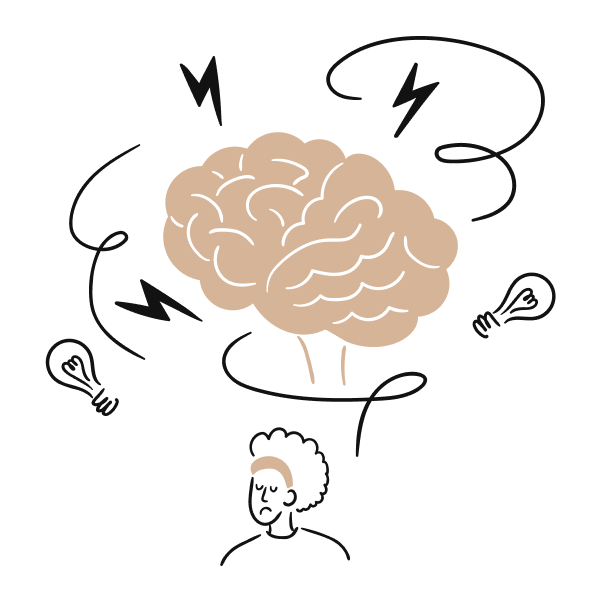You worry so much that it affects your daily life. With generalized anxiety disorder (brooding disorder), you keep mulling things over in your head. Learn more about symptoms, causes and treatment of generalized anxiety disorder and get advice on what you can do yourself.
What is generalized anxiety disorder?
Is generalized anxiety disorder a disease?
Generalized anxiety disorder is a recognized mental illness according to the DSM-5 and is considered such because it affects your daily functioning and well-being to such an extent.
Symptoms of generalized anxiety disorder
- You fret excessively: your thoughts don’t seem to stop;
- You have difficulty controlling your thoughts;
- Your problems have no solution;
- You often feel restless;
- You are often anxious.
Other signs to recognize generalized anxiety disorder are;
- You are tense;
- You get tired easily;
- You feel restless and agitated;
- You are easily irritated;
- You have difficulty falling asleep;
- Your muscles feel tense;
- You experience memory problems more quickly or have trouble concentrating.
How is it different from other anxiety disorders?
There are several types of anxiety disorders and mental disorders that have similarities to a brooding disorder. In generalized anxiety disorder, the subject of the anxiety changes continuously unlike other anxiety disorders with a more specific fear.
With agoraphobia, for example, you have a fear of being in a room where many people congregate. If you have social phobia, you are fearful of other people’s reactions and judgment. With a mulling disorder, you may worry about everything. Tomorrow may be different from today.
I am often tired – do I have burnout?
- Fatigue in burnout. In the case of burnout, you have been chronically over-stressed and everything is too much for you. You are exhausted. You no longer have a grip on the situation and you no longer function well in your daily activities.
- Fatigue in mulling disorder. If you brood excessively and are often anxious, but you can still function and carry out daily activities, then you have a brooding disorder. Be aware that you do become more susceptible to developing burnout.
I worry a lot – what is the difference with compulsive thoughts?
What is the difference with depression?
When you have depression, you feel gloomy and listless. You feel intensely tired, sad, and sometimes everything even feels hopeless. Anxiety and depression often go together, but not always. And when you suffer from an anxiety or brooding disorder, it does not automatically mean you feel depressed.
How does generalized anxiety disorder develop?
There is no one specific cause for generalized anxiety disorder. Multiple factors are involved:
- Genetics
If generalized anxiety disorder is common in your family, you may be predisposed to excessive brooding yourself. - Character
Certain character traits may also play a role in the development of generalized anxiety disorder, for example, if you have a high sense of responsibility. - Environment
If you see a lot of anxiety in someone close to you, you may adopt the anxiety. - Upbringing
An upbringing with overprotection and excessive control teaches you to always be alert for danger. This increases the risk of generalized anxiety disorder. - Severe event
An intense event is another possible factor contributing to the development of generalized anxiety disorder. Examples include:- The death of a parent;
- Being bullied;
- Experiencing an accident.
How does generalized anxiety disorder affect daily life?
- It potentially puts pressure on relationships, such as by constantly seeking reassurance;
- The excessive brooding, constant stress and concomitant lack of sleep affects your physical health.
- You are less able to perform your work or other (social) activities.
- It can eventually lead to depression.
How can you overcome generalized anxiety disorder?
What can you do?
Are you experiencing symptoms? Then try one of the following tips:
- Let go of what is beyond your control. Consider how much influence you yourself have on what you are mulling over. No matter how much you think about it, could you ever actually change it? Realizing that the situation is beyond your control helps you let go of the brooding thoughts.
- Trust someone. Do you feel that brooding is affecting your life? Talking about your feelings relieves and together you can look for help.
- Relax. Do things you enjoy to distract yourself from the brooding thoughts.
- Set a mulling time for yourself. You may mull at an appointed time, for a predetermined amount of time. During the day, postpone mulling until the mulling moment.
Advice for my partner
The following advice will help your partner and you better cope with generalized anxiety disorder:
- Encourage your loved one to seek help: a visit to the family doctor or direct contact with a psychologist.
- Support your partner in doing the exercises associated with any treatment.
Treating a generalized anxiety disorder
Generalized anxiety disorder or brooding disorder is well treatable with therapy. For generalized anxiety disorder, Cognitive Behavioral Therapy (CBT), Acceptance and Commitment Therapy (ACT) and hypnotherapy are commonly used therapies. The therapies primarily help you learn to better cope with excessive fretting and anxiety.
We briefly explain below how each therapy helps treat a brooding disorder.
- CBT
In Cognitive Behavioral Therapy, you learn to challenge your anxious thoughts. You have certain thoughts óabout your thoughts. For example, you think “worrying will help me avoid problems” and “worrying will make me crazy. But is this really the reality? You learn to challenge your thoughts, through which you discover that your thoughts are not always the truth.
- ACT
With Acceptance and Commitment Therapy, you focus on the aspects of life that really matter to you, rather than fixating on thoughts and feelings over which you have no control. Treatment focuses on developing resilience, helping you learn to better cope with fears and anxious thoughts.
- Hypnotherapy
With hypnotherapy, you can get back in touch with your deep emotions and also experience true relaxation. This state of hypnosis is also called trance. It brings your body and mind into a calm and relaxed state, in which you explore your subconscious. This allows you to learn to listen to the subconscious yourself, without the constant distraction of your conscious brain and intrusive thoughts. This learning process helps you gain new insights that help you better deal with fears and thoughts.
Help with Generalized Anxiety Disorder
Do you have questions about agoraphobia? Or do you have doubts about when to consult a psychologist?
-
Have you tried many things yourself and still experiencing symptoms? Feel free to call us at 085-1308900 or contact us online. This way you can feel if there is a click and if you feel comfortable.
-
At iPractice, you will work with 2 psychologists. Treatment consists of both online contact and regular consultation room sessions at one of iPractice’s locations. Or find out more information about the intake and treatment process at iPractice.
-
Cognitive behavioral therapy (CBT) and acceptance and commitment therapy (ACT) are common treatments for Generalized Anxiety Disorder. A treatment with us lasts on average 3 to 6 months.
-
With a referral letter from the general practitioner and an official diagnosis according to DSM-5 guidelines, almost every insurer will reimburse the cost. See which health insurance companies reimburse our care.
-
Read Maria’s personal story about her anxiety disorder and how treatment at iPractice helped her in recovery. Or read more experience stories about anxiety disorders.


 Nederlands
Nederlands




